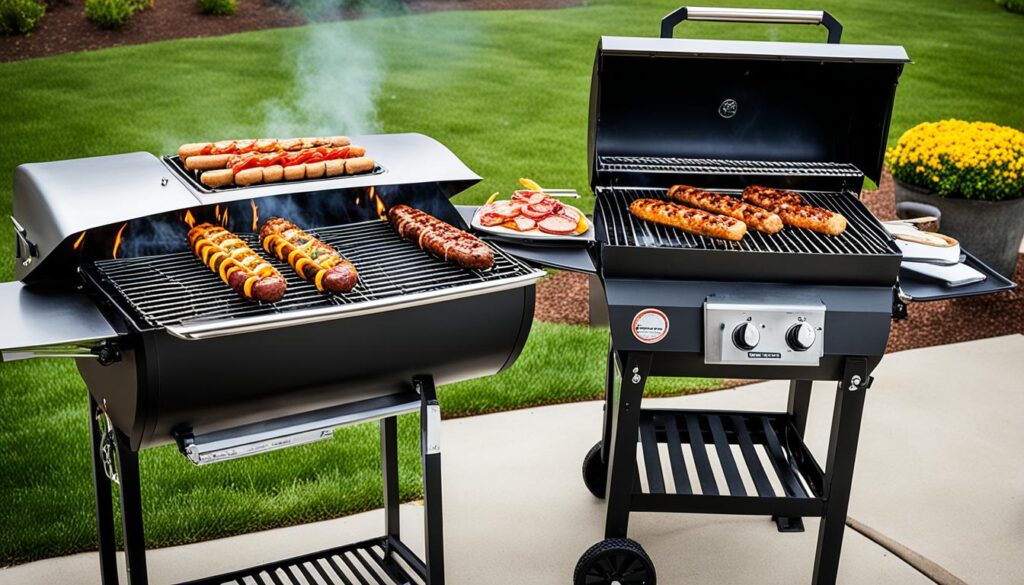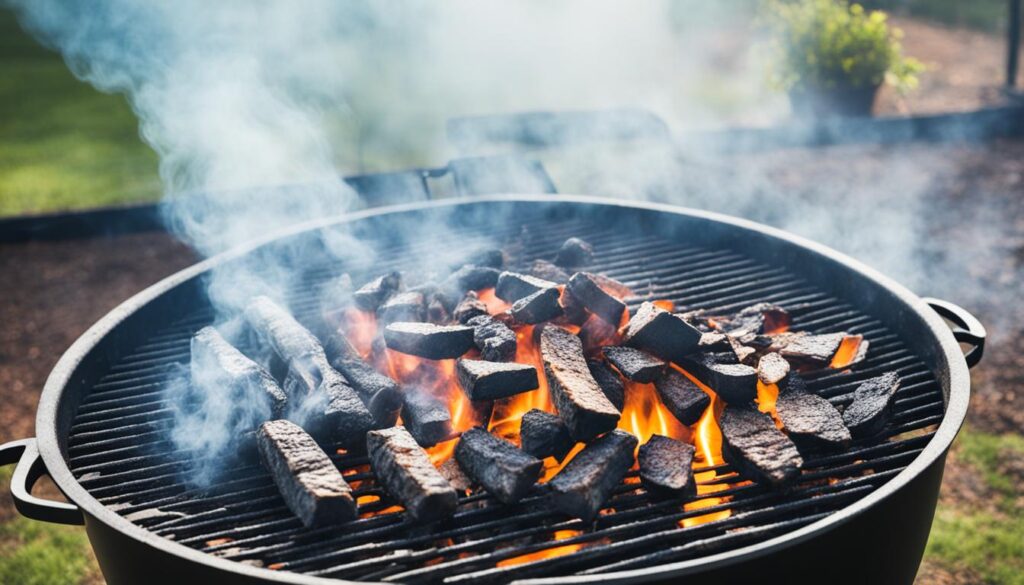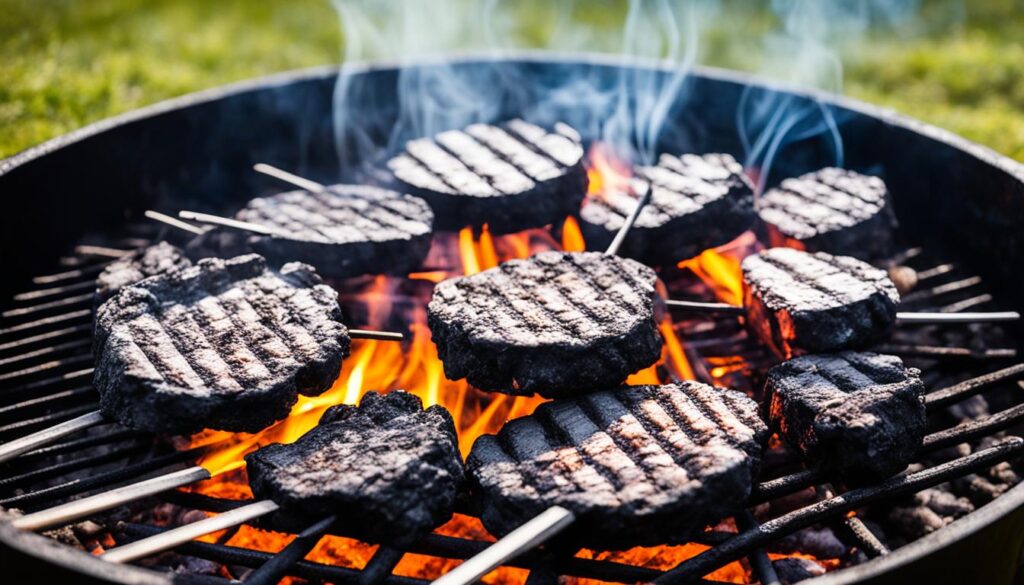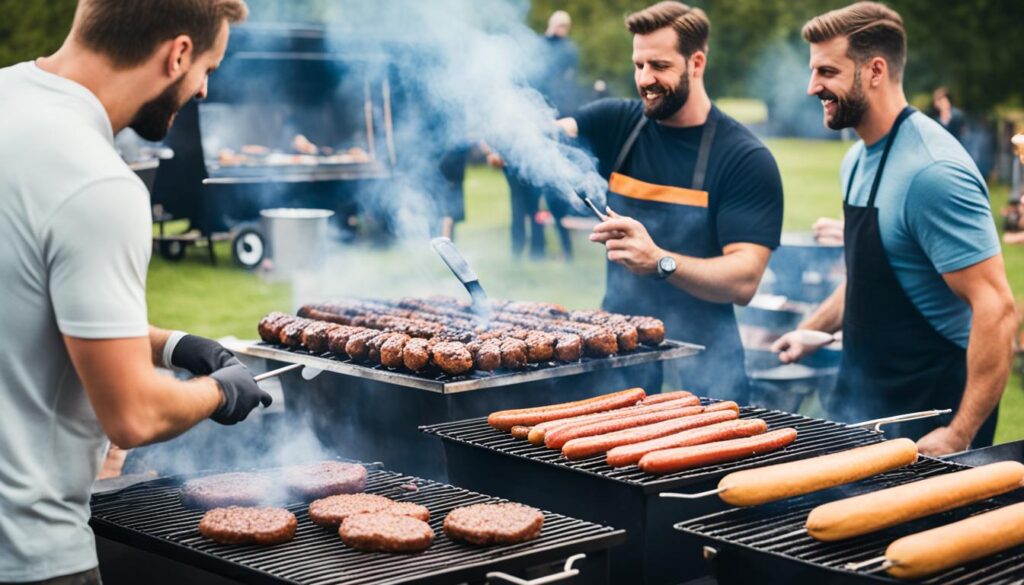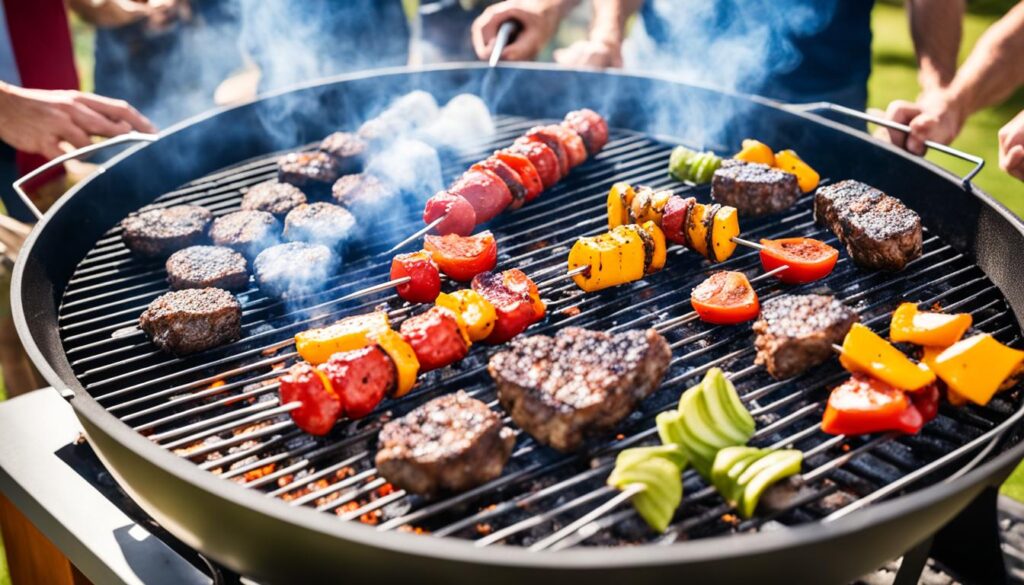The age-old debate between gas and charcoal grilling has always divided barbecue enthusiasts. While gas barbecues offer convenience and ease of use, charcoal barbecues are favored for their ability to impart a smoky flavor to the food. Let’s explore the pros and cons of each to determine which one is better.
Key Takeaways:
- Gas barbecues are known for their convenience and efficiency.
- Charcoal barbecues offer versatility in cooking and the ability to create a smoky flavor.
- The flavor difference between gas and charcoal grills is more noticeable in long-cooked foods.
- Gas grills offer precise temperature control, while charcoal grills require more practice to control the heat.
- Cleaning and maintenance differ between gas and charcoal grills.
The Benefits of Gas Barbecues
Gas barbecues offer a range of benefits that make them a popular choice among grilling enthusiasts. Whether you’re hosting a backyard gathering or enjoying a midweek cookout, gas barbecues provide convenience and efficiency.
One of the key advantages of gas barbecues is their quick start-up time. In under 10 minutes, you can have your grill ready and preheated to the desired temperature. This is especially handy when you’re short on time or hosting a hungry crowd.
Precise temperature control is another standout feature of gas barbecues. With adjustable knobs, you can easily regulate the heat and achieve the perfect cooking temperature for your food. This level of control allows for consistent results and prevents overcooking or undercooking.
The direct and consistent heat of gas barbecues is ideal for searing meat and achieving that coveted charred crust. It’s also great for fast cooking, which comes in handy when you want to whip up a quick weeknight meal.
Gas barbecues are known for their versatility in catering to larger gatherings. With their ample cooking space, you can grill multiple items at once, making it easier to serve a crowd. Whether it’s burgers, steaks, or vegetables, there’s plenty of room to cook everything to perfection.
Despite their many benefits, there are a few considerations when using gas barbecues. Heat retention can be a challenge, especially when cooking larger cuts of meat or slow-cooking recipes. Additionally, while gas barbecues produce delicious food, some grill enthusiasts argue that they may lack the depth of flavor that can be achieved with charcoal grills.
When it comes to indirect cooking and smoking, gas barbecues have limited options compared to charcoal barbecues. If you’re a fan of slow-cooked ribs or smoked brisket, you may prefer the traditional approach that charcoal grills offer.
Gas Barbecue Pros:
- Quick start-up time
- Precise temperature control
- Direct and consistent heat for searing and fast cooking
- Versatility for larger gatherings
While gas barbecues may have their limitations, their convenience, efficiency, and versatility make them a popular choice among grill enthusiasts. The decision ultimately depends on your personal preferences and cooking style.
Which Gas Barbecue is Best?
When it comes to choosing the best gas barbecue for your grilling needs, there are several factors to consider. Building your dream outdoor cooking setup involves more than just picking any random grill. You want one that suits your lifestyle, preferences, and budget. To help you make an informed decision, here are some important considerations:
1. Build Time
If you’re looking for a gas barbecue that can be set up quickly, opt for models with easy assembly and minimal parts. Consider whether you want a freestanding or built-in model, as these factors can affect the build time.
2. Storage Options
Think about where you’ll be storing your gas barbecue when it’s not in use. Some models come with built-in storage cabinets or shelves, providing a convenient place to keep your grilling tools and accessories.
3. Versatility
Do you want a gas barbecue that can do more than just grilling? Consider models with additional features like side burners, rotisserie kits, or smoking capabilities. This can add versatility to your outdoor cooking experience.
4. Sturdiness
Look for gas barbecues made from high-quality materials that are built to last. Stainless steel and cast aluminum are popular choices due to their durability and resistance to rust and corrosion.
Remember to read gas barbecue reviews from trusted sources to get an idea of the performance and reliability of different models. These reviews can provide insights into factors such as heat distribution, temperature control, and overall user experience. Additionally, consider your budget and specific grilling needs to find the best gas barbecue that ticks all the boxes.


The Benefits of Charcoal Barbecues
When it comes to outdoor cooking, charcoal barbecues offer a range of benefits that make them a favorite among grilling enthusiasts. From the versatility in cooking styles to the enhanced flavors, charcoal barbecues have their own unique advantages.
Firstly, one of the standout advantages of charcoal barbecues is their versatility. With a charcoal barbecue, you have the ability to grill at high temperatures for those perfectly seared steaks or at low temperatures for slow-cooked succulent ribs. The flexibility of cooking temperatures allows you to experiment with a variety of dishes and achieve different levels of char and flavor.
Furthermore, charcoal barbecues excel when it comes to slow cooking large cuts of meat. The radiant heat produced by the burning charcoal ensures even cooking, resulting in tender and juicy meats. This makes charcoal barbecues an excellent choice for those summer barbecues, Sunday roasts, and other special occasions where you want to impress your guests with deliciously cooked meats.
In addition, charcoal barbecues are also ideal for indirect grilling and smoking. By arranging the charcoal on one side of the grill and the food on the other, you can create a controlled indirect cooking zone. This method is perfect for cooking delicate foods or using the barbecue as a smoker to infuse your meat with mouthwatering smoky flavors. The option to use wood chips or chunks for additional flavor makes charcoal barbecues a must-have for barbecue enthusiasts who crave that authentic smoky taste.
However, it’s worth noting that charcoal barbecues require more time and patience to start and control the heat. Unlike gas barbecues that have instant ignition, charcoal barbecues need time to heat up and reach the desired temperature. This may require some practice and mastery to effectively manage the heat and achieve consistent results. But once you’ve mastered the art of charcoal grilling, the rich flavors and unique cooking experience are well worth the effort.


In conclusion, charcoal barbecues offer a range of advantages that make them a popular choice for outdoor cooking. From their versatility in cooking styles to the enhanced flavors and smoky aromas, charcoal barbecues provide a unique and rewarding grilling experience. While they may require a bit more time and effort, the results speak for themselves. So, if you’re a true barbecue lover, don’t miss out on the benefits and delights of charcoal grilling.
Which Charcoal Barbecue is Best?
When it comes to choosing the best charcoal barbecue, there are several factors to consider. Capacity, storage options, build time, longevity, and quality of materials all play a significant role in finding the perfect grill for your needs. Whether you’re looking for an affordable portable model or a higher-end grill from a specialist brand, it’s essential to do your research and read reviews to make an informed decision.
Capacity is an important consideration, especially if you frequently entertain or have a large family. Depending on your needs, you may opt for a smaller grill for intimate gatherings or a larger one to accommodate more guests.
Storage options can also influence your choice of charcoal barbecue. If you have limited outdoor space, a model with foldable shelves or a compact design may be beneficial. On the other hand, if you have ample storage space, you may prioritize a larger grill with built-in cabinets or storage compartments.
Build time and ease of assembly are factors that can impact your overall grilling experience. Some grills require extensive assembling, while others come pre-assembled or with minimal assembly required. Consider your comfort level with assembling and the time you’re willing to invest in setting up your grill.
Longevity and quality of materials are crucial for ensuring the durability and performance of your charcoal barbecue. Look for grills made from high-quality materials like stainless steel or cast iron, as they tend to offer better heat retention and withstand the elements for longer.
To find the best charcoal barbecue, researching different brands and models is essential. Read reviews from reputable sources, compare features, and consider your specific needs and preferences before making a purchase.
Remember, the right charcoal barbecue for you might not be the same as someone else’s. It’s important to find the grill that aligns with your grilling style, budget, and desired features. By taking the time to evaluate different options and weigh the pros and cons, you’ll be well on your way to finding the best charcoal barbecue for your outdoor cooking adventures.


Gas vs Charcoal: Flavor Comparison
The flavor difference between gas and charcoal grills is often a point of contention. Many barbecue enthusiasts believe that charcoal grills offer a smokier flavor, which adds depth and complexity to the food. The taste is primarily influenced by the drippings from the food hitting the heat source and smoking up over the food, creating a distinct aroma. This smoky flavor is synonymous with the traditional charcoal grilling experience.
On the other hand, gas grills produce clean combustion, resulting in a milder flavor profile. While they may not provide the same level of smokiness as charcoal grills, gas grills still deliver delicious results. The drippings from the food may not produce as much smoke, but the final taste is still enjoyable.
The flavor difference between gas and charcoal grills becomes more noticeable in long-cooked, slow-cooked foods. Charcoal grills excel at low and slow cooking, allowing the food to absorb the smoky flavors over an extended period. Gas grills, while still capable of slow cooking, may not impart the same depth of flavor as charcoal grills in these cooking methods. However, when it comes to quick grilling or cooking more delicate foods, gas grills can be a convenient option without compromising on taste.
Gas vs Charcoal Flavor: Key Points
- Charcoal grills are believed to offer a smokier flavor due to the drippings from the food creating smoke over the heat source.
- Gas grills produce cleaner combustion and a milder flavor profile, but still provide delicious results.
- The flavor difference is more noticeable in long-cooked, slow-cooked foods.
- Gas grills excel in quick grilling or cooking delicate foods, while charcoal grills shine in low and slow cooking methods.
Gas vs Charcoal: Temperature Control
When it comes to temperature control, gas grills and charcoal grills have distinct differences.
Gas grills offer easy temperature control with precision settings, allowing for accurate cooking. With the turn of a knob, you can adjust the heat to your desired level, whether you’re searing a steak or slow-cooking a tender roast. This makes gas grills ideal for beginners or those who prefer a more hands-off approach to grilling. The precise temperature control also ensures evenly cooked meals.
On the other hand, charcoal grills require more practice and attention to control the heat as they rely on live fire. Achieving the right temperature can take time and practice, as you need to adjust the airflow and the positioning of the charcoal to create different heat zones. This level of control is valued by experienced grillers who enjoy the process of managing the fire and creating a unique flavor profile.
Another advantage of gas grills is their faster fire-up and cool-down time compared to charcoal grills. Gas grills can be ready to cook in just a few minutes, while charcoal grills require time for the coals to ignite and reach the desired temperature. This makes gas grills more convenient for impromptu barbecues or when you’re short on time.
Whether you prioritize convenience and precise temperature control or enjoy the traditional art of charcoal grilling, the choice between gas and charcoal ultimately comes down to personal preference. Both types of grills have their own unique advantages, so consider your cooking style, flavor preferences, and level of grilling expertise when making a decision.
Gas vs Charcoal: Cleaning and Maintenance
When it comes to cleaning and maintenance, gas and charcoal grills have different requirements. Let’s take a closer look at the cleaning and maintenance needs for each type.
Gas Grills
A gas grill is generally easier to clean compared to a charcoal grill. The cleaning process involves occasional tasks such as emptying the grease traps and cleaning the grill bars. To keep your gas grill in top condition, it’s important to regularly remove any accumulated grease or debris. This ensures optimal performance and prevents any potential flare-ups during cooking.
Charcoal Grills
On the other hand, cleaning a charcoal grill involves more labor-intensive tasks due to the ash residue. Regular disposal of the ash is necessary to maintain proper airflow and prevent any clogging in the grill. Additionally, cleaning the grill bars is also essential to remove any food remnants or residue. This ensures that your charcoal grill is ready for the next cooking session and prevents any unwanted flavors from previous meals.
While charcoal grills require more effort in cleaning and ash management, the unique flavor and cooking experience they provide make it worth the extra maintenance. Gas grills, on the other hand, may have more fiddly knobs and separate parts to clean, but they offer the convenience of quick and easy cleaning.
Remember, regular cleaning and maintenance not only prolong the lifespan of your grill but also ensure safe and hygienic cooking. By following the manufacturer’s guidelines and cleaning recommendations, you can enjoy many delicious meals on your gas or charcoal grill for years to come.
Conclusion: Personal Preference Matters
The debate between gas and charcoal grills has been a long-standing one, and the ultimate decision depends on personal preferences and cooking style. Both gas and charcoal grills have their distinct advantages and offer different experiences.
Gas grills are a popular choice for those seeking convenience and ease of use. They provide quick and easy outdoor cooking, as they are ready to cook in no time. With precise temperature control, you can achieve accurate cooking results. Gas grills are perfect for those who enjoy midweek meals or hosting larger gatherings.
On the other hand, charcoal grills are favored by enthusiasts who value the versatility and flavor of traditional charcoal grilling. Charcoal grills allow for high or low temperature grilling, making them ideal for slow cooking large cuts of meat. The radiant heat of charcoal adds a unique flavor to your food, providing that smoky taste that many crave.
When making a decision, it’s important to consider factors such as convenience, flavor, temperature control, and cleaning. Each grill has its pros and cons, and it’s up to you to determine which features are most important to you. Regardless of your choice, both gas and charcoal grills can deliver delicious results when used correctly.
